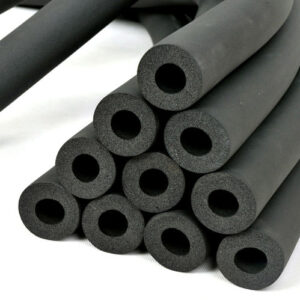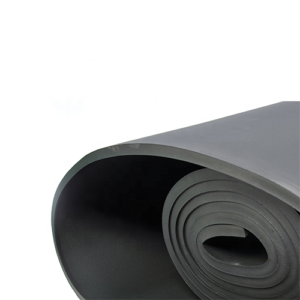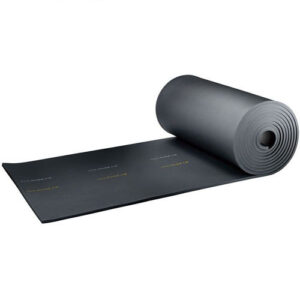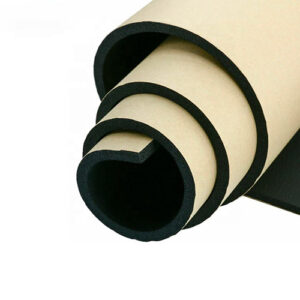Brief introduction of Rubber Foam
The rubber foam products of our company are produced by imported high-end technology and automatic continuous equipment. We have developed a rubber foam insulation material with excellent performance through in-depth research. The major raw materials we use are NBR/PVC.
The main characteristics are: low density, close and even bubble structure, low thermal conductivity, cold resistance, extremely low water vapor transmissible, low water absorptive capacity, great fireproof performance, superior anti-age performance, good flexibility, stronger tear strength, higher elasticity, smooth surface, no formaldehyde, shock absorption, sound absorption, easy to install. The product is suitable for a wide range of temperature from -40℃ to 120℃.
Our Class 0/1 insulation is generally black in color, other colors are available upon request. The product comes in tube, roll and sheet form. The extruded flexible tube are specially designed to fit the standard diameters of copper, steel and PVC piping. Sheets are available in standards precut sizes or in rolls.
Specification of Rubber Foam
|
Technical Data
|
||||
|
Item
|
Unit
|
Specification
|
Standard
|
|
|
Density range
|
Kg/m3
|
40-85
|
GB/T 6343
ASTM D1667
|
|
|
Flammability
|
Oxygen index
|
%
|
≥32
|
GB/T 2406
|
|
SDR
|
——
|
≤75
|
GB/T 8627
|
|
|
Fire Rating
|
——
|
Class 0 & Class 1
|
BS 476 Part 6 & Part 7
|
|
|
Conductivity factor -Average temperature
|
-20℃
|
W/(M·K)
|
≤0.030
|
GB/T 10294
ASTM C518
|
|
0℃
|
≤0.032
|
|||
|
40℃
|
≤0.036
|
|||
|
Water vapor Permeability
|
Coefficient
|
g/(m·s·pa)
|
≤2.8 X 10-11
|
GB/T 17146
|
|
Factor
|
——
|
≥10000
|
||
|
Water adsorption ratio in vacuum
|
%
|
≤4
|
GB/T 17794
|
|
|
Dimension stability (105℃±3℃, 7d)
|
%
|
≤5
|
GB/T 8811
ASTM C534
|
|
|
Crack resistance
|
N/cm
|
≥3.0
|
GB/T 10808
|
|
|
Comperssion resilience ratio
(Comperssion ratio 50%, Comperssion time 72h) |
%
|
≥70
|
GB/T 6669
|
|
|
Anti-ozone
(Ozone pressure 202mpa 200h) |
——
|
Not cracking
|
GB/T 7762
|
|
|
Aging resistance (150h)
|
——
|
Slightly crumpling, no cracks, no pin holes, not eforming
|
GB/T 16259
|
|
|
Flexibility
|
——
|
Excellent
|
ASTM D1056
|
|
|
Temperature
|
℃
|
-50 — 120
|
GB/T 17794
|
|
|
Products type
|
Pipe & sheet
|
|||
|
Color
|
Black, gray and other colors
|
|||
|
Regular size
|
Pipe: inner diameter 6-108mm
Sheet: thickness 10-30mm
|
|||
|
Packing
|
PE plastic bags / exported standard carton
Diversified packaging to meet your needs
|
|||



Range of specifications of rubber foam tube insulation

Note:
1.The above specifications are commonly used specifications. Special specifications are available according to request of customer.
2. Rubber foam sheet and pipe are normally in black. Other colors are available according to requirements of customer.
3. It is recommended to use sheet when outer diameter of pipe exceeds 89mm.
4. Multiple layers packing is recommended where the thickness of heat insulation materials which you need are greater than 25mm.
5. The width of the sheet can be customized to 1-2 meters according to customer’s requirements.
1.The above specifications are commonly used specifications. Special specifications are available according to request of customer.
2. Rubber foam sheet and pipe are normally in black. Other colors are available according to requirements of customer.
3. It is recommended to use sheet when outer diameter of pipe exceeds 89mm.
4. Multiple layers packing is recommended where the thickness of heat insulation materials which you need are greater than 25mm.
5. The width of the sheet can be customized to 1-2 meters according to customer’s requirements.
Table of required thickness comparison for installation
(Due to the different environmental conditions in each region, the following data is for reference only.)
|
Environmental conditions
|
Dimension of heat-preservation pipe
|
Suitable thickness at temperature of piping(mm)
|
|||||
|
Temperature
|
Relative Humidity
|
Inch
|
Millimeter
|
13℃
|
7℃
|
3℃
|
-15℃
|
|
26.5℃
|
50%
|
3/8-3
|
10-76
|
10
|
10
|
10
|
15
|
|
3-5
|
76-127
|
15
|
15
|
15
|
15
|
||
|
5-10
|
127-254
|
15
|
15
|
15
|
20
|
||
|
29℃
|
70%
|
3/8-3
|
10-76
|
10
|
15
|
15
|
20
|
|
3-5
|
76-127
|
15
|
15
|
15
|
20
|
||
|
32℃
|
80%
|
5-10
|
127-254
|
15
|
15
|
15
|
25
|
|
3/8-5
|
10-127
|
15
|
15
|
20
|
20
|
||
|
5-10
|
127-254
|
20
|
25
|
25
|
35
|
||
|
32℃
|
85%
|
3/8-1.5
|
10-38
|
20
|
25
|
30
|
45
|
|
1.5-3
|
38-76
|
20
|
30
|
30
|
50
|
||
|
3-5
|
76-127
|
20
|
30
|
35
|
60
|
||
|
5-10
|
127-254
|
25
|
30
|
40
|
60
|
||
|
>10
|
>254
|
30
|
40
|
45
|
70
|
||
|
32℃
|
90%
|
1/8-0.5
|
3-13
|
25
|
32
|
35
|
45
|
|
0.5-2.5
|
13-64
|
30
|
35
|
45
|
60
|
||
|
2.5-5
|
64-127
|
30
|
35
|
45
|
65
|
||
|
5-10
|
127-254
|
35
|
45
|
50
|
75
|
||
|
>10
|
>254
|
35
|
50
|
60
|
75
|
||
Note: Factors need to considered when choosing the thickness of insulation material
1. The higher the environmental temperature is, the thicker the material is.
2. The higher the relative humidity is, the thicker the material is.
3. The lower the temperature of the medium is, the thicker the material is.
4. The larger the daimeter of the pipe, the thicker the material is.
1. The higher the environmental temperature is, the thicker the material is.
2. The higher the relative humidity is, the thicker the material is.
3. The lower the temperature of the medium is, the thicker the material is.
4. The larger the daimeter of the pipe, the thicker the material is.





